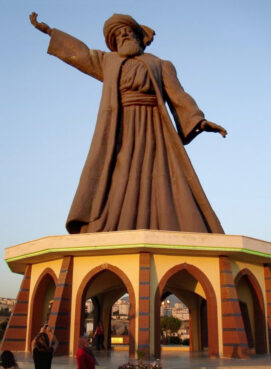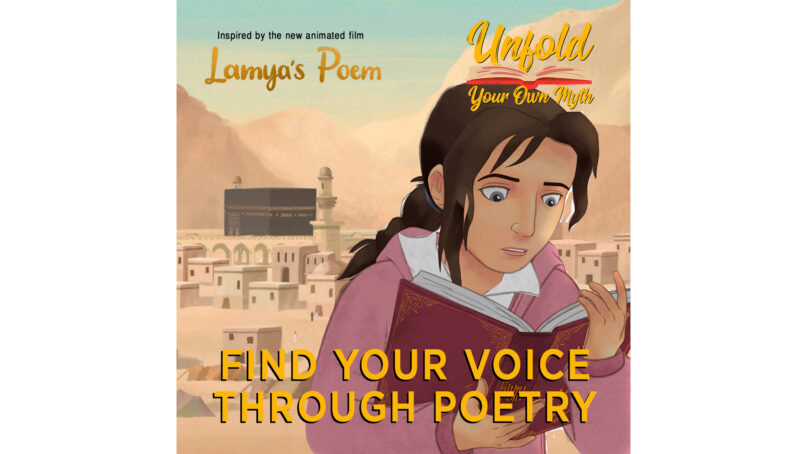(RNS) — Friday (Sept. 30) is the 815th birthday of the world-renowned Muslim poet, Rumi. We can talk about this medieval teacher and poet in the present tense because, like his contemporary St. Francis of Assisi, Rumi’s life and writings continue to inspire millions of people around the world. In fact, Jalaludin Muhammad Rumi remains this country’s best-selling poet, in company with the likes of Walt Whitman, Emily Dickinson, and Robert Frost.
Rumi might be pleased to hear that he and his work are playing a central role in a new online creative writing program designed to unleash the power of self-expression for young displaced people and Muslims in the United States. The project, called Unfold Your Own Myth, is the brainchild of Unity Productions Foundation, a nonprofit media company working in collaboration with KidSpirit, the world’s only youth-led platform for building community through life’s big questions.
Youth ages 11 to 18 meet in small groups for several hour-long online and in-person workshops where they learn creative writing and build relationships with one another. The emphasis is on poetry, with participants learning to write in different forms, from haiku to spoken word, following prompts from on-screen facilitators and eventually producing original works of their own to share together.
Unfold Your Own Myth is both a dynamic writing workshop and a community-building program, designed to bolster the spirit and provide creative agency to young refugees from Syria and Ukraine, as well as Rumi’s own homeland of Greater Khorasan, just north of present-day Afghanistan.
The project’s title comes from Rumi’s writings:
“Don’t be satisfied with stories—
How things have gone with others.
Unfold your own myth.”
Rumi’s poems were timeless and relevant. They touched not only the hearts of students who were experiencing poem writing and poetic devices for the first time, but also those students who were well-versed in poetry and were budding poets themselves.
His words are also the perfect advice for teenagers who, finding themselves in classrooms far from home, may feel displaced and wanting to express themselves in their own words.

A statue of the poet Rumi in Buca, Turkey. Photo © Faik Sarıkaya/wowTURKEY.com
Rumi speaks to their condition; as a boy he was a refugee himself. His father’s diaries tell how he, his family and a group of friends left the Samarkand region ahead of the Mongol invasions. Regional instability drove them first to distant Mecca, then to Damascus and finally to Rumi’s adoptive city of Konya, Turkey.
His father’s diaries indicate that this radical uprooting deeply disturbed his teenage son.
The journey took years and was formative for Rumi, as author Brad Gooch’s recent book, “Rumi’s Secret: The Life of the Sufi Poet of Love,” records.
The Unfold Your Own Myth Project draws on disruptive events in his early years, using them as reference points for today’s displaced youth, helping them to come to terms with their own experience. The workshops manage this in a visually engaging way by showing selected clips from Unity Productions Foundation’s animated movie, Lamya’s Poem. This soon-to-be-released feature film dramatizes Rumi’s youth, depicting his experiences in parallel with those of a 21st-century refugee, a girl named Lamya, who is on the run with her mother fleeing the civil war in Syria.
Like many of the workshop participants, Lamya has an active imagination. Like them, she struggles with displacement but is helped by a book of Rumi’s poems in her backpack.
Some of Rumi’s best-known works speak about uprootedness and the desire to relocate. His “Song of the Reed” gives voice to a musical instrument made from a bamboo reed. Torn from a riverbed and made into a flute, the reed has a voice and a story to tell:
“Listen to the reed and the tale it tells,
How it sings of separation:
‘Since the day I was torn from my reed bed,
My song has been a strain of love and pain.
I long for One who understands the signs
To mingle their heart with mine.’
To heal a heart that bleeds,
Listen, listen to the reed.”
Poetry isn’t therapy, but writing poems can be therapeutic in the same way that a hike into high mountains can be healing, providing altitude and a healthy overview. The premise of the Unfold Your Own Myth Project is that we are nearer to being whole when we find our own voices.
Flight from home is never an easy option, but sometimes it can offer fresh opportunities. The project takes Rumi’s advice seriously, providing a safe space to reclaim through language some ownership over the stories of our lives.
(Michael Wolfe is a poet and author of “The Hajj: An American Pilgrimage to Mecca. He cofounded Unity Productions in 1999. Sumreena Hussain is a certified middle school teacher and a student of the Miftaah Institute where she studies Islamic knowledge. The views expressed in this commentary do not necessarily reflect those of Religion News Service.)





